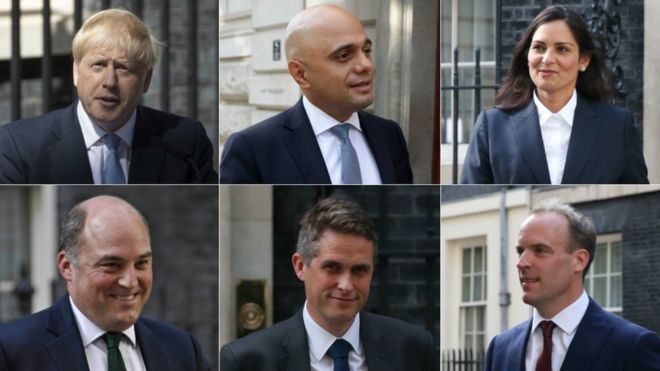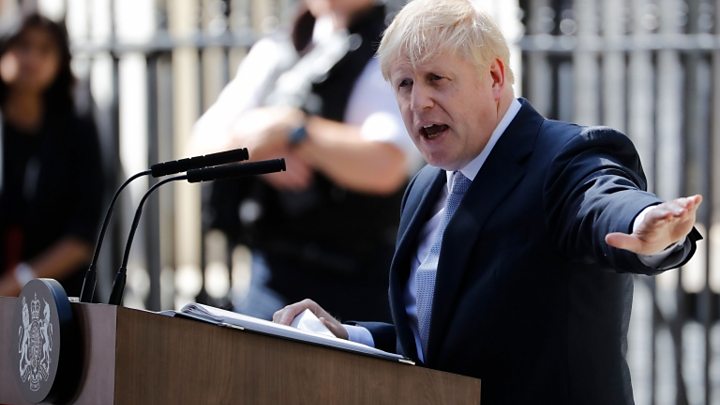
On Wednesday, Mr Johnson gave key roles to leading Brexiteers.
Dominic Raab and Priti Patel returned to government as foreign secretary and home secretary respectively.
And Sajid Javid became chancellor - as more than half of Theresa May's old cabinet, including leadership rival Jeremy Hunt, quit or were sacked.
Other key appointments included:
- Stephen Barclay: Brexit secretary (retains post)
- Michael Gove: Chancellor of the Duchy of Lancaster, and no-deal Brexit planning
- Ben Wallace: Defence secretary
- Liz Truss: International trade secretary
- Matt Hancock: Health secretary (retains post)
- Gavin Williamson: Education secretary
- Nicky Morgan: Culture secretary
- Andrea Leadsom: Business secretary
- Amber Rudd: Work and pensions secretary (retains post)
- Jacob Rees-Mogg: Leader of the Commons
- See the full cabinet here
Following his appointment, Mr Rees-Mogg, who led the pro-Brexit Tory European Research Group (ERG), denied there had been a "Leave" takeover of the cabinet.
"Boris is bringing the country together, the party together, through his cabinet appointments," he said.
- Live updates as new cabinet prepares to meet
- How much would PM's shopping list cost?
- In Pictures: Boris Johnson becomes UK's new PM
Mr Johnson's new cabinet saw 17 of Mrs May's former senior ministers being axed or stepping down.
Former Foreign Secretary Jeremy Hunt said he had been offered an alternative role but had turned it down, while leading Brexiteers Penny Mordaunt and Liam Fox were also replaced as defence secretary and international trade secretary respectively.
Both supported Mr Hunt in the Tory leadership contest.

'A prime minister in a hurry'

These are the decisions of a prime minister in a hurry.
One who is aware that he's up against the clock.
One who has to pull off - within a few months - what his predecessor could not manage over years.
The team surrounding Boris Johnson has been put together with one goal in mind - to help him keep the promise he's made, to see the country leave the European Union in good time.
Number 10 believes it shows strength of purpose - a new administration determined and willing to take decisions after years of drift and disappointment.
Brexit believers have the top roles. But it is not a cabinet made up purely of the most burning Eurosceptics.

Mr Johnson used his first speech as prime minister to reiterate his determination to take the UK out of the EU by the 31 October "no ifs, no buts".
The UK was originally supposed to leave the EU on 29 March but the deadline was moved to 31 October, after MPs rejected Mrs May's withdrawal deal three times.
Labour's shadow chancellor John McDonnell said if Mr Johnson campaigned on the platform of a no-deal Brexit in any forthcoming general election, his own party would "almost certainly be Remain".
However, he told ITV that Labour would still look at any new deal Mr Johnson negotiated with the EU.
"But at the moment I can't see him stitching up a deal that's acceptable either to Labour or to quite a bit of his own side as well - so it looks as though we will then be in a straight situation between a no deal and Remain," he added.
Meanwhile, First Minister Nicola Sturgeon has written to the new prime ministerto say it is "essential" Scotland has an alternative option to his Brexit plan - and to indicate she would continue to press for a referendum on Scottish independence.

For Boris's speech, see: Boris Johnson's first speech as UK PM